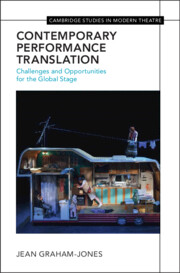Book contents
- Contemporary Performance Translation
- Cambridge Studies in Modern Theatre
- Contemporary Performance Translation
- Copyright page
- Contents
- Figures
- Acknowledgments
- Introduction
- 1 Translationality in Performance
- 2 The Over-translated, the Under-translated, the Untranslatable, and the Limits of Performance Translation
- 3 Translationality and the Atypical Actor in Performance
- 4 Translationality and the Decolonial Gesture in Performance
- Conclusion
- References
- Index
3 - Translationality and the Atypical Actor in Performance
Published online by Cambridge University Press: 19 December 2024
- Contemporary Performance Translation
- Cambridge Studies in Modern Theatre
- Contemporary Performance Translation
- Copyright page
- Contents
- Figures
- Acknowledgments
- Introduction
- 1 Translationality in Performance
- 2 The Over-translated, the Under-translated, the Untranslatable, and the Limits of Performance Translation
- 3 Translationality and the Atypical Actor in Performance
- 4 Translationality and the Decolonial Gesture in Performance
- Conclusion
- References
- Index
Summary
The book’s final chapters engage with the actor (and spectator) as translational agent and site. Chapter 3 considers performances by what playwright-dramaturg Kaite O’Reilly calls the atypical actor, focusing on how current conversations in disability and Deaf studies and in theatre, dance, and performance translation studies might mutually illuminate. To illustrate, the chapter examines first the author’s performance work with deaf performance artist Terry Galloway and the Mickee Faust Club and its “ethic of accommodation,” counterposing an ethic of translationality that avoids accommodation’s asymmetric power dynamic. Next considered are O’Reilly’s plays and dramaturgical practices, where translationality can be seen operating between individuals, institutions, and cultures and highlighting the artistic potential for incorporating into performance frequently sidelined access devices. The chapter continues, adopting a translational approach to actor training and casting before concluding with self-translation as perhaps an even more effective disruptor of the prevailing disability-as-theatrical-metaphor, returning first to Galloway and the author’s participation in the Disability and Deaf Arts festival production of The Ugly Girl before closing with reflections upon watching disability rights activist and well-known British actor Liz Carr perform in Assisted Suicide: The Musical, a master-class in self-translation.
Information
- Type
- Chapter
- Information
- Contemporary Performance TranslationChallenges and Opportunities for the Global Stage, pp. 87 - 114Publisher: Cambridge University PressPrint publication year: 2024
